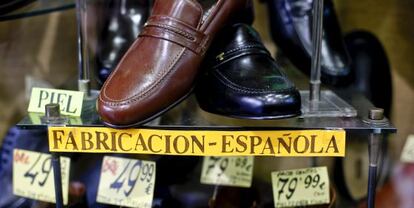Buy me, I’m “Made in Spain”
Brands such as Balay, Renault and Hero are highlighting the Spanish origin of their products to win over consumers Price most influences purchases, research shows

Among all the many different appeals manufacturers make to consumers to persuade them to buy their products, a new message is drawing attention: "Made in Spain."
A few major brands such as Balay, Renault and Hero have been running television and internet ads highlighting the Spanish origin of their goods; at the same time many websites are encouraging people to buy and sell homegrown products.
Consumer experts say that underscoring the national origin of goods is a growing trend because it appeals to people's personal commitment to the country's economy at a time of crisis and high unemployment rates.
"Thank you for purchasing one of the home appliances that we built," says a worker at one of Balay's six plants in Spain in a commercial for the company. What the ad is selling, ultimately, is the fact that Balay's refrigerators and washing machines are giving Spaniards jobs.
"This campaign is very important to us because we want to use it to say thank you," explains the company website. "Thank you to those who choose us, because you make it possible for nearly 4,000 people to work in our Spanish factories."
Other multinationals (Balay became a part of Bosch and Siemens Home Appliances in 1989) are also employing the "made in Spain" claim. Last March, French car manufacturer Renault launched an ad for its Mégane model that stated: "Made in Spain to be the best."
And yet everyone seems to agree that price continues to be the determining factor when it comes to choosing a product.
According to Ernesto Ganuza, director of an Andalusian consumer habit survey conducted by the Institute of Advanced Social Studies (IESA), "the most influential factor above everything else is price. This was true even before the crisis."
Many websites are encouranging people to buy and sell homegrown products
A 2010 survey by the same agency showed that, out of the eight factors that played a role in purchasing decisions, information about the origin of the product ranked seventh, behind price, ingredients, brand recognition, potential health effects and environmental factors.
It is only in the agri-food industry that origin labels appear to play a greater role in purchasing decisions, says Pablo Rodríguez, a sociology professor at La Laguna University who specializes in consumer habits and tourism. However, buyers do not so much appreciate the fact that the food product is nationally produced, as the fact that the familiar Denominación de origen labels seen on everything from wine to ham, cheese and honey are a guarantee of quality and freshness.
In Madrid's Maravillas fresh food market, some of the fruit and vegetable stands display signs next to the tomatoes that read: " De la tierra " (grown locally), a claim that seems to work. "They're better," asserts one customer.
Some processed food companies have also incorporated the "made in Spain" catchphrase into their marketing. Jam manufacturer Hero, which is headquartered in Switzerland, claims on its jars that its products originate from "the fruit orchards of Murcia." The company has been saying this ever since it opened a processing plant in Alcantarilla in Murcia and began commercializing its products in the 1930s.
Right now, the Made in Spain phrase is in and of itself an advertising campaign, Rodríguez admits. Yet "it will not be very useful if you are not competitive in everything else; appealing to that emotional factor can only have an influence if you meet other criteria such as price and quality."
Daniel Fernández-Kenz, director of the economics department at the IE Business School, agrees: "It's about producing the best item. Using the national flag as a marketing strategy does not seem right. What you need to do is make the best products."
Yet a growing chorus of voices supports the thesis that this advertising technique is legitimate and can also be especially effective at a time when domestic consumption is rock bottom.
Juan Martín is one of the thousands of Spanish workers who lost their job in the crisis. After 11 years as an office worker, he was fired over a year ago, and decided to set up his own business, which opened in December in downtown Madrid. What's special about Fanespania is that everything in it was made in Spain. "It is a useful way to contribute to the national economy," he says. "It's about helping each other out."
The emotional factor can only have an influence if you meet other criteria"
Martín knows that people are not really looking at the tag to know where the article was made, but how much it costs. That is why his wares are affordable, he says. "If they were more expensive than the ones made abroad, people would not buy them," he admits. Yet more and more customers tell him they support his initiative.
While it is still early, Martín is already dreaming about expanding his new business. Fanespania's providers include companies and small-scale craftspeople, and Martín adds he would feel "very proud" if he knew his project had given someone a job.
Blai Encinas runs a similar venture. As a former employee in the auto industry, he saw 100,000 euros' worth of car accessories and repair parts being imported from Asia every month. So when he lost his job a year and a half ago, he created proximalia.com, an online store that only sells nationally made parts.
"I saw it clearly," he explains. "We have a factory in Teruel that produces the same things that were being imported from Asia. This led me to conclude that if we consume what we make ourselves, our companies will not be forced to shut down or relocate.
"People are very happy because the quality standards are higher compared with the articles from some other places."
Although not everyone goes as far as to sell Spanish-only products, a growing number of businesses are displaying signs in their store windows advertising the ones that are. At a shoe store called Reyma, in the Bravo Murillo area of Madrid, the owner has written "Made in Spain" on the price tags of some of the slippers in the display windows. "They are better quality and people ask for them, that's why we put up the sign," says Rodolfo González.
Shoe stores highlight these products because the quality of Spanish footwear is recognized by customers both within Spain and abroad. But this is not necessarily the case with other types of goods. Roger Navarro, a young publicist from Barcelona who founded the website comprasmadeinspain.com, believes the Spain brand is prestigious abroad yet "we have an inferiority complex domestically."
"The ads of the 1970s always told us that foreign-made goods were better," he says. His blog, now a year old, aims to help build a new image for the "Made in Spain" logo.
"Spanish quality has nothing to envy of outsiders," he says. "If people bought more articles 'made in Spain,' it wouldn't end the crisis, but there would be a rise in the consumption of Spanish goods. And if they are made here, it would mean jobs."
This same point was made in January 2009 by then-Industry Minister Miguel Sebastián, who appealed to Spaniards to buy homegrown products to combat unemployment. According to him, it could have saved 120,000 jobs that year alone.
His successor, José Manuel Soria, made a similar appeal last summer when he asked Spaniards to take their vacations in Spain.
Both ministers were widely criticized for their patriotic appeal. Fernández-Kenz, of the IE Business School, says that "in a global market, highlighting where the product was made does not mean it is going to create jobs in that country. Something made in Spain may have part of its production elsewhere, and vice versa. What would happen if each country called on citizens to buy only national products, travel domestically and reject imports? It is a clear message of protectionism."
Tu suscripción se está usando en otro dispositivo
¿Quieres añadir otro usuario a tu suscripción?
Si continúas leyendo en este dispositivo, no se podrá leer en el otro.
FlechaTu suscripción se está usando en otro dispositivo y solo puedes acceder a EL PAÍS desde un dispositivo a la vez.
Si quieres compartir tu cuenta, cambia tu suscripción a la modalidad Premium, así podrás añadir otro usuario. Cada uno accederá con su propia cuenta de email, lo que os permitirá personalizar vuestra experiencia en EL PAÍS.
¿Tienes una suscripción de empresa? Accede aquí para contratar más cuentas.
En el caso de no saber quién está usando tu cuenta, te recomendamos cambiar tu contraseña aquí.
Si decides continuar compartiendo tu cuenta, este mensaje se mostrará en tu dispositivo y en el de la otra persona que está usando tu cuenta de forma indefinida, afectando a tu experiencia de lectura. Puedes consultar aquí los términos y condiciones de la suscripción digital.









































